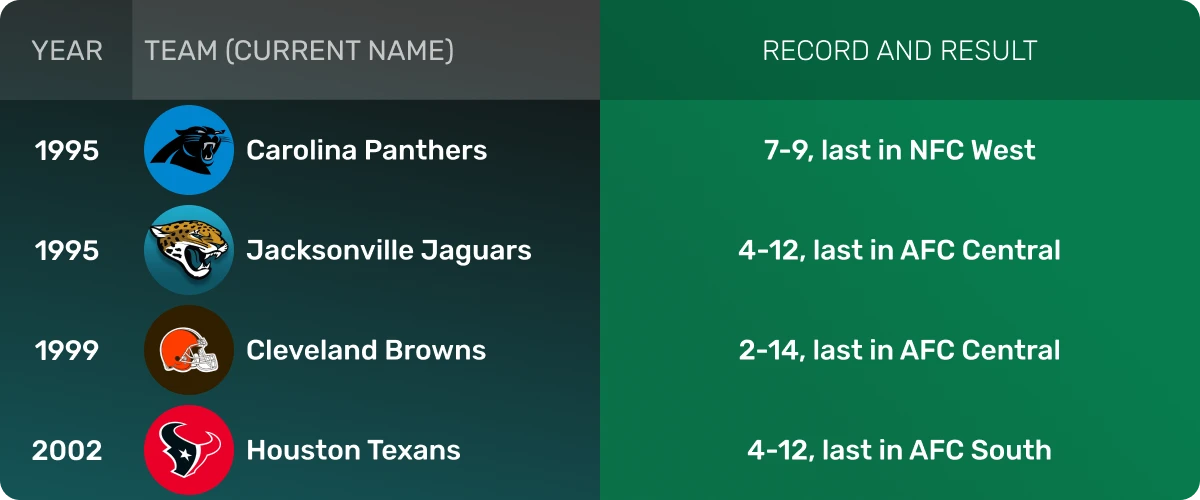American Leagues and Expansion Teams
Expansion teams date all the way back to 1969, and this is the process of sports leagues in the United States “giving birth” to a new team by allowing a city (or state) to have a participating team in a respective league, representing them in the said sport and coming up with an arena where the team would host its home games, as well as being sponsored by a group of owners who will provide initial funding for the team.
Most of the time, the team is not yet ready to contend at a high level. Their players are composed of free-agent signings, and even drafting non-protected players from various teams in the league. This just means that most of the squad has no real chemistry until the time they are assembled, nor do they even have a coaching staff that is synced well. Most of the time, young players, coaches, and veteran free agents are signed in the offseason to assemble the team.

Interestingly, expansion teams tend to be cannon fodder for the established teams in the league, meaning that they are usually expected to rank below the standings and are often relegated to build their competitive level through constant signings and the annual draft that comes into play.
Since 1969, there have been a total of 37 franchises added to the big leagues of the NFL, NBA, NHL, and MLB. It is worth noting that all of these teams have finished with a losing record and did not contend for any postseason action – save for the 2018 Vegas Golden Knights, who achieved a rare feat by making it to the playoffs and even reaching the Stanley Cup Final.
Expansion Teams in the NHL
Almost every expansion team has had a losing record in their first season. Most of these teams had a tough time building competitive rosters right out of the gate. Whether it was a lack of established talent, inconsistent performance, or growing pains with team chemistry, most expansion teams struggled to be competitive.
It often takes expansion teams several years to rebuild and compete at a high level. For example, the Florida Panthers and Anaheim Mighty Ducks, both in 1993, were competitive but still didn’t make major playoff pushes in their first years.
NHL Expansion Team Records in their Inaugural Season

It usually takes a few seasons of drafting well, making trades, and developing players before teams can consistently contend. For instance, the Panthers won its first title in 2024, while the Ducks managed to pull off a victory in 2007.
The Vegas Golden Knights are the exception to this trend. In their inaugural 2017-2018 season, they finished an impressive 51-24-7-11, claiming the top spot in the Pacific Division and even making it all the way to the Stanley Cup Final—an incredibly rare feat for an expansion team. Their success was largely due to a unique combination of good management, smart roster selections in the expansion draft, and a strong team culture.
Expansion Teams in the MLB
Much like the NHL, MLB expansion teams have also faced significant struggles in their inaugural seasons. While the struggles varied, most new teams in Major League Baseball encountered poor records, tough competition, and growing pains as they tried to find their footing.
For starters, Nearly every MLB expansion team faced severe growing pains in their inaugural seasons, with most finishing well below .500. For instance, the New York Mets (1962) finished 40-120, the worst record in National League history for an expansion team at the time.
MLB Expansion Team Records in their Inaugural Season

The jump from minor league baseball to the majors can be jarring. Teams have to adjust to the level of competition, long seasons, and the higher expectations that come with being in the major leagues. This is something that is apparent in the records of teams like the Seattle Mariners (1977) with their 64-98 season and the Kansas City Royals (1969), who finished 69-93 despite playing in a weaker division.
Though most expansion teams struggled, there have been outliers in MLB expansion history. The most notable case is the 1998 Arizona Diamondbacks, who, despite a 65-97 debut, were able to build a competitive team fairly quickly and won the World Series just four years later in 2001.
Expansion Teams in the NBA
When it comes to NBA expansion teams, the story is much the same as in other major professional sports leagues: struggles in the first season. Expansion teams are often ill-equipped to compete immediately, especially given that they start with a roster full of unproven or underdeveloped talent.
Across the board, NBA expansion teams have had a tough time getting wins in their first season. Most NBA expansion teams finish their inaugural seasons at or near the bottom of their respective divisions or conferences.
NBA Expansion Team Records in their Inaugural Season

Expansion teams rarely have access to experienced players when they first enter the league. They're forced to build a roster primarily from expansion drafts, free agency, and some of the worst teams' castoffs, resulting in limited talent and depth. The Miami Heat and Vancouver Grizzlies, for instance, were forced to compete with established teams that had years of roster development and strong team cultures. This talent gap made immediate success almost impossible.
For expansion teams, the early seasons are really about survival, learning, and laying the groundwork for future success. Many of the expansion teams took years (sometimes decades) to become competitive, and their inaugural seasons were just a part of the long rebuilding process. Out of all these teams, Miami is the only team to win a league title twice, while the Raptors won its first title in 2019.
Expansion Teams in the NFL
Just like the first three leagues, the story of their inaugural seasons is quite similar to those in other leagues: struggles to win. Most of these teams faced challenges in establishing their roster, getting players to gel, and adjusting to the competitiveness of the NFL. While there is usually a sense of excitement around an expansion team, the reality of the NFL is that it is one of the most competitive leagues in the world. New teams are expected to face a steep learning curve when trying to compete with long-established franchises.
For instance, the Cleveland Browns (1999), reborn after the team’s relocation, had a 2-14 record, finishing last in the AFC Central. Despite having a loyal fan base and a storied history, the team had to build a new foundation, which proved difficult.
NFL Expansion Team Records in their Inaugural Season

One of the biggest challenges for expansion teams is the lack of experienced leadership both on the field and in the coaching staff. The Carolina Panthers had a rookie head coach in Dom Capers and a new quarterback in Steve Beuerlein, which meant they lacked the leadership that many other NFL teams had built over years of experience.
Some expansion teams, despite their rough starts, have gone on to become competitive, even playoff-bound teams in a short amount of time. Houston Texans, despite finishing 4-12 in their first season (2002), eventually built a solid team and became playoff contenders in the 2010s, and remain consistent even up to date.
MLS and the Expansion Teams
There’s a big difference in the MLS – with 19 teams added since 2007, five of those have managed to reach the playoffs, which includes the Seattle Sounders, (2009), Atlanta United (2017), LAFC (2018), Nashville SC (2020), and St. Louis City SC (2023) – in their first seasons.
Considering how San Diego FC has been able to capitalize their impressive start to the 2025 season – beating four of the last five MLS champions in their first seven games, one can expect that there is indeed a high expectation that they can win big and even deliver a stunning run in the campaign.
With the way the odds are stacked against expansion teams in their first seasons, San Diego may well find its way to the top of the league and emerge as the second incarnation of the Vegas Golden Knights. Here’s how the San Diego FC stands in the MLS so far this season after a phenomenal start in their first seven games and now stand second in the Western Conference.
San Diego FC 2025 MLS Season Record (As of April 15, 2025)

Can the San Diego FC Beat the Odds?

















_800x800.webp)






























